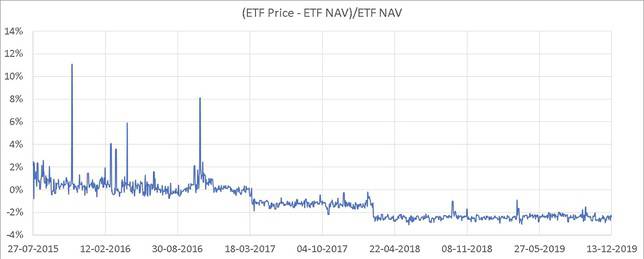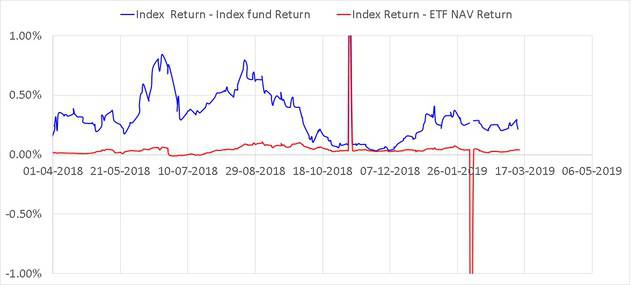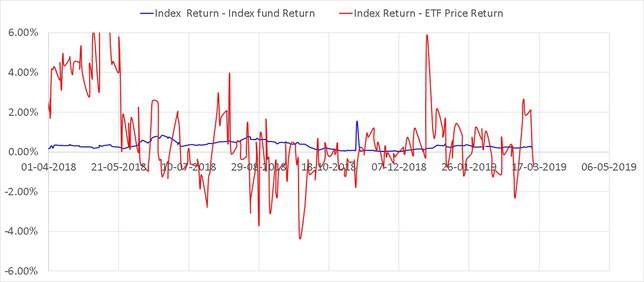Last Updated on August 22, 2022 at 11:29 pm
SBI ETF Nifty 50, thanks to contributions by the EPFO since late 2015 has emerged as the largest ETF and the largest mutual fund in the country. We ask if it makes sense to choose this over UTI Nifty Index fund (direct plan).
SBI ETF Nifty 50 with a total expense ratio of 0.07% is not the cheapest ETF, but it is still 30% less expensive than the most low-cost index fund (as on date): UTI Nifty which costs 0.1%. On the face of it, this looks like a no-brainer decision: go with the cheapest product.
Investors assume expenses and tracking error are good ways to choose index funds and ETFs. Sadly there is no uniform way to report tracking errors and even what is available is hard to find and compare.
Join 32,000+ readers and get free money management solutions delivered to your inbox! Subscribe to get posts via email! (Link takes you to our email sign-up form)
🔥Want to create a complete financial plan? Learn goal-based investing? Exclusive access to our DIY tools? Increase your income with your skills? Enjoy massive discounts on our robo-advisory tool & courses! 🔥
Also comparing the tracking error of an ETF with an index fund is wrong because the ETF’s NAV is used for the calculation. Investors often tend to forget that, unlike a mutual fund, the ETF has two components – the price and NAV.
The price of an ETF is determined by supply and demand among the unitholders. The returns an ETF investor gets is based on buy price and sell price, not the buy-NAV and sell-NAV. Therefore tracking errors and return differences between index and ETF should be computed based on the price information and not NAV.
SBI EFT Nifty 50 Price to NAV percentage difference
 One can immediately see that the ETF price has been trading lower and lower than the NAV. This essentially means low demand. Investors tend to get excited with ETFs trading lower than NAV. They assume they would be getting a discount.
One can immediately see that the ETF price has been trading lower and lower than the NAV. This essentially means low demand. Investors tend to get excited with ETFs trading lower than NAV. They assume they would be getting a discount.
Not so fast! Someone in the unitholder pool has to sell for the investor to buy. Why would anyone willingly sell a lower price? This graph alone should be enough for investors to avoid SBI NIfty 50 ETF.
High AUM is not a positive in an ETF. An ETF with an active intermediary will quickly reduce price-nav deviations. To understand how it works see: Interested in ETFs? Here is how you can select ETFs by checking how easy it is to buy/sell them
Thus in a healthy ETF, the price should move above and below the NAV periodically and quickly.
Return Comparison: SBI ETF Nifty 50 NAV vs UTI Nifty Index fund NAV
Blue line: Nifty 50 TRI index return minus UTI Nifty return (quarterly)
Red line: Nifty 50 TRI index return minus SBI ETF Nifty NAV-based return (quarterly)
The spikes are caused by missing NAV/Price data and can be ignored.

Return Comparison: SBI ETF Nifty 50 Price vs UTI Nifty Index fund NAV
Blue line: Nifty 50 TRI index return minus UTI Nifty return (quarterly)
Red line: Nifty 50 TRI index return minus SBI ETF Nifty Price-based return (quarterly)

All returns are quarterly (annualized via XIRR function). If you compare the NAVs, the ETF looks better. However, what you buy and sell is the price. Use that, and the picture is quite different.
The ETF price is significantly more volatile, resulting in significant positive and negative departures from the index.
Notice that the red line is often negative. This means ETF Price-based return > Index TRI return. This may seem like a good thing, but remember this is theoretical.
In the real world, if the price is consistently lower than the NAV, there will be more buyers than sellers. This is extremely unhealthy and points to inefficient management.
In conclusion, avoid SBI Nifty 50 ETF. Stick to UTI Nifty 50 Index fund (direct plan).
🔥Enjoy massive discounts on our courses, robo-advisory tool and exclusive investor circle! 🔥& join our community of 7000+ users!
Use our Robo-advisory Tool for a start-to-finish financial plan! ⇐ More than 2,500 investors and advisors use this!
Track your mutual funds and stock investments with this Google Sheet!
We also publish monthly equity mutual funds, debt and hybrid mutual funds, index funds and ETF screeners and momentum, low-volatility stock screeners.





- Do you have a comment about the above article? Reach out to us on Twitter: @freefincal or @pattufreefincal
- Have a question? Subscribe to our newsletter using the form below.
- Hit 'reply' to any email from us! We do not offer personalized investment advice. We can write a detailed article without mentioning your name if you have a generic question.
Join 32,000+ readers and get free money management solutions delivered to your inbox! Subscribe to get posts via email! (Link takes you to our email sign-up form)
About The Author
 Dr M. Pattabiraman(PhD) is the founder, managing editor and primary author of freefincal. He is an associate professor at the Indian Institute of Technology, Madras. He has over ten years of experience publishing news analysis, research and financial product development. Connect with him via Twitter(X), Linkedin, or YouTube. Pattabiraman has co-authored three print books: (1) You can be rich too with goal-based investing (CNBC TV18) for DIY investors. (2) Gamechanger for young earners. (3) Chinchu Gets a Superpower! for kids. He has also written seven other free e-books on various money management topics. He is a patron and co-founder of “Fee-only India,” an organisation promoting unbiased, commission-free investment advice.
Dr M. Pattabiraman(PhD) is the founder, managing editor and primary author of freefincal. He is an associate professor at the Indian Institute of Technology, Madras. He has over ten years of experience publishing news analysis, research and financial product development. Connect with him via Twitter(X), Linkedin, or YouTube. Pattabiraman has co-authored three print books: (1) You can be rich too with goal-based investing (CNBC TV18) for DIY investors. (2) Gamechanger for young earners. (3) Chinchu Gets a Superpower! for kids. He has also written seven other free e-books on various money management topics. He is a patron and co-founder of “Fee-only India,” an organisation promoting unbiased, commission-free investment advice.Our flagship course! Learn to manage your portfolio like a pro to achieve your goals regardless of market conditions! ⇐ More than 3,000 investors and advisors are part of our exclusive community! Get clarity on how to plan for your goals and achieve the necessary corpus no matter the market condition is!! Watch the first lecture for free! One-time payment! No recurring fees! Life-long access to videos! Reduce fear, uncertainty and doubt while investing! Learn how to plan for your goals before and after retirement with confidence.
Our new course! Increase your income by getting people to pay for your skills! ⇐ More than 700 salaried employees, entrepreneurs and financial advisors are part of our exclusive community! Learn how to get people to pay for your skills! Whether you are a professional or small business owner who wants more clients via online visibility or a salaried person wanting a side income or passive income, we will show you how to achieve this by showcasing your skills and building a community that trusts and pays you! (watch 1st lecture for free). One-time payment! No recurring fees! Life-long access to videos!
Our new book for kids: “Chinchu Gets a Superpower!” is now available!


Must-read book even for adults! This is something that every parent should teach their kids right from their young age. The importance of money management and decision making based on their wants and needs. Very nicely written in simple terms. - Arun.Buy the book: Chinchu gets a superpower for your child!
How to profit from content writing: Our new ebook is for those interested in getting side income via content writing. It is available at a 50% discount for Rs. 500 only!
Do you want to check if the market is overvalued or undervalued? Use our market valuation tool (it will work with any index!), or get the Tactical Buy/Sell timing tool!
We publish monthly mutual fund screeners and momentum, low-volatility stock screeners.
About freefincal & its content policy. Freefincal is a News Media Organization dedicated to providing original analysis, reports, reviews and insights on mutual funds, stocks, investing, retirement and personal finance developments. We do so without conflict of interest and bias. Follow us on Google News. Freefincal serves more than three million readers a year (5 million page views) with articles based only on factual information and detailed analysis by its authors. All statements made will be verified with credible and knowledgeable sources before publication. Freefincal does not publish paid articles, promotions, PR, satire or opinions without data. All opinions will be inferences backed by verifiable, reproducible evidence/data. Contact information: To get in touch, use this contact form. (Sponsored posts or paid collaborations will not be entertained.)
Connect with us on social media
- Twitter @freefincal
- Subscribe to our YouTube Videos
- Posts feed via Feedburner.
Our publications
You Can Be Rich Too with Goal-Based Investing
 Published by CNBC TV18, this book is meant to help you ask the right questions and seek the correct answers, and since it comes with nine online calculators, you can also create custom solutions for your lifestyle! Get it now.
Published by CNBC TV18, this book is meant to help you ask the right questions and seek the correct answers, and since it comes with nine online calculators, you can also create custom solutions for your lifestyle! Get it now.Gamechanger: Forget Startups, Join Corporate & Still Live the Rich Life You Want
 This book is meant for young earners to get their basics right from day one! It will also help you travel to exotic places at a low cost! Get it or gift it to a young earner.
This book is meant for young earners to get their basics right from day one! It will also help you travel to exotic places at a low cost! Get it or gift it to a young earner.Your Ultimate Guide to Travel
 This is an in-depth dive into vacation planning, finding cheap flights, budget accommodation, what to do when travelling, and how travelling slowly is better financially and psychologically, with links to the web pages and hand-holding at every step. Get the pdf for Rs 300 (instant download)
This is an in-depth dive into vacation planning, finding cheap flights, budget accommodation, what to do when travelling, and how travelling slowly is better financially and psychologically, with links to the web pages and hand-holding at every step. Get the pdf for Rs 300 (instant download)